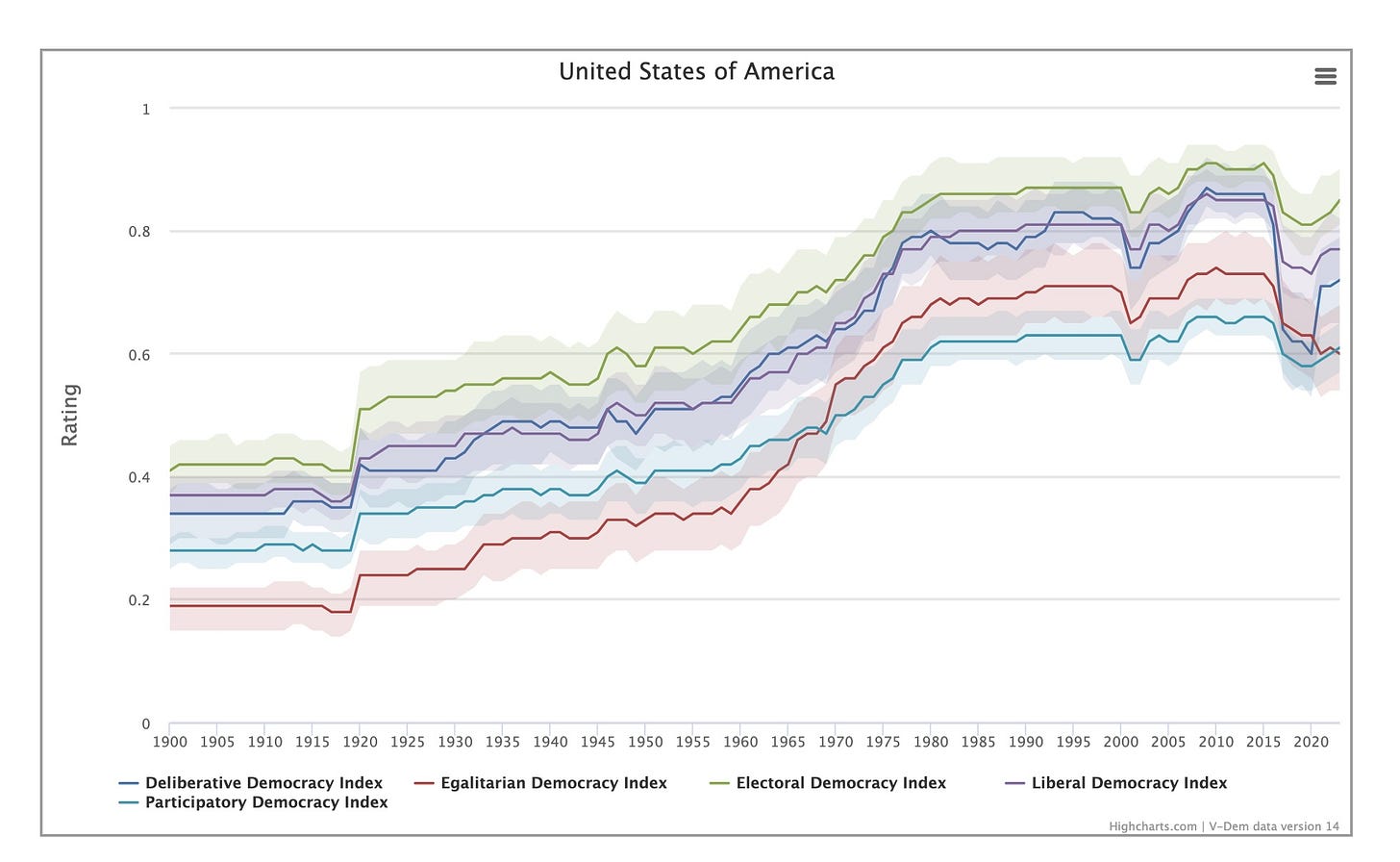Here’s the podcast version of my Sustain What conversation with three authors of a sobering, and yet slightly hopeful, paper identifying a rising number of autocracies that are followed by a sharp social and political u-turn to democratization. A rough dynamic transcript is here. The paper is here:
The hopeful part of the open-access study is this:
The analysis presents a systematic empirical overview of patterns and developments of U-Turns [from autocracy toward democracy between 1900 and 2023]. A key finding is that 52% of all autocratization episodes become U-Turns, which increases to 73% when focusing on the last 30 years. The vast majority of U-Turns (90%) lead to restored or even improved levels of democracy.
But that has to be set against the trends tracked in the sobering annual reports of the V-Dem Institute (V-Dem stands for Varieties of Democracy), where four of the five study authors work. In our conversation, Staffan Lindberg, the Institute’s founding director, put it this way. Listen to him or read the statement below:
This is worse than in the 1930s moving into World War II. The number of countries, 42, at the same time moving back on democracy is higher than ever before. The share of the number of countries in the world is also higher than before. The share of the world population living in countries moving back on democracy is greater than ever before. It's unprecedented the strength of this wave of autocratization.
Insert 2/11/2025 - I’ve uploaded V-Dem’s brief summarizing the new study here:
Here are the core conclusions:
• Contemporary democracies are fairly resilient to the onset of autocratization: Since 1994, 54% have not experienced backsliding. Yet, democracies rarely survive if autocratization sets in [for more than a decade].
• Breakdown does not prevent a return of democracy: Roughly 50% recover shortly after a democratic breakdown in a U-turn episode.
• [Early], active, stiff, and coordinated resistance against autocratization from pro-democracy actors and institutions is key to making a U-turn.
Please explore V-Dem Institute’s annual reports and its graphing tool, which provides a dynamic view of country-by-country scoring on a variety of democracy “vital signs.” Here’s the United States, and you can see the effect of Trump’s first term on the indicators:
We discuss the underlying data, the analysis on u-turns toward democracy following autocratic surges, and - most important - the societal and governmental capacities that seem essential to foster such reversals.
Breaking norms
Lindberg explains how the simplicity and vagueness of the United States Constitution is both the source of the adaptability and resilience of American democracy but also a source of deep vulnerability facing extreme disruption. The country runs on norms as much as hard-edged rules, he says. And when a figure like Trump comes in, deadset on pushing norms to the breaking point, that spells trouble:
It's very easy to tear down democracy in the U .S. if the elites want to do it. There's a famous political scientist, Giovanni Sartori, who was at Columbia University for many, many years. He said once that the American democracy works not thanks to, but despite, the American Constitution. That's almost swearing in church in the U .S., right? And he said it works only as long as the Americans wanted to work. So that in these times, I think, that’s a critical aspect of democracy in the U .S. that one needs to keep thinking about.
Fabio Angiolillo, another author, explains how public resistance, including by people in key professional sectors like journalism, is essential, as is overcoming naive discounting of the risks of autocracy in countries that haven’t experienced it:
There’s much, much more and I hope you take time to listen. And do share this post.
There are more links and other resources in the “curtain raiser” post I published on Sunday:
With Autocracy Surging, It's Worth Exploring a Paper Charting "U-Turn" Reversals to Democratization
Updated post-show: As Trump’s second term races through its “shock and awe” phase, I hope you’ll listen to, and share, my conversation with several authors of an important new study showing that, between 1900 and 2023, more than half of the world’s autocratic regimes were followed by a “u-turn” pattern toward restored or improved levels of democracy.
Independent insights
Vanessa Williamson, a senior fellow in governance studies at the Brookings Institution, wrote an excellent three-part brief on the erosion of American democracy in 2023. Part 3 was Democratic erosion: The role of executive aggrandizement.
Key points:
Even a legitimately elected leader can undermine democracy if they consolidate power or use government resources to debilitate their political opposition.
Election integrity is threatened if incumbents can weaponize the provision of government services or government jobs for partisan ends.
Given the dysfunction in Congress and the current ideological makeup of the courts, there are reasons to worry about executive aggrandizement in the United States.

















Share this post